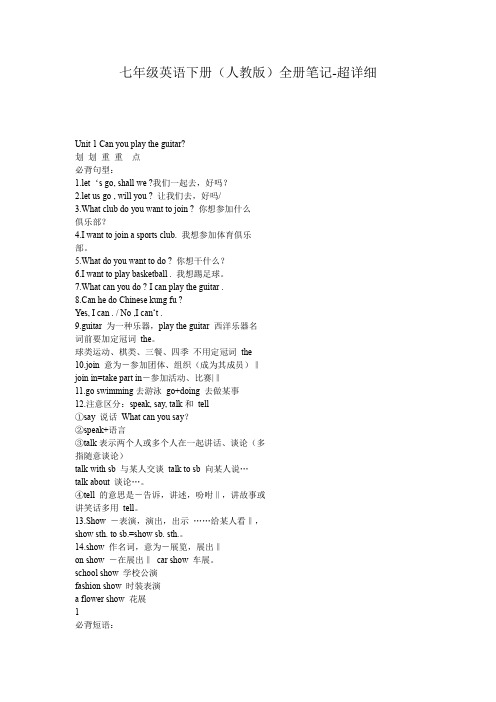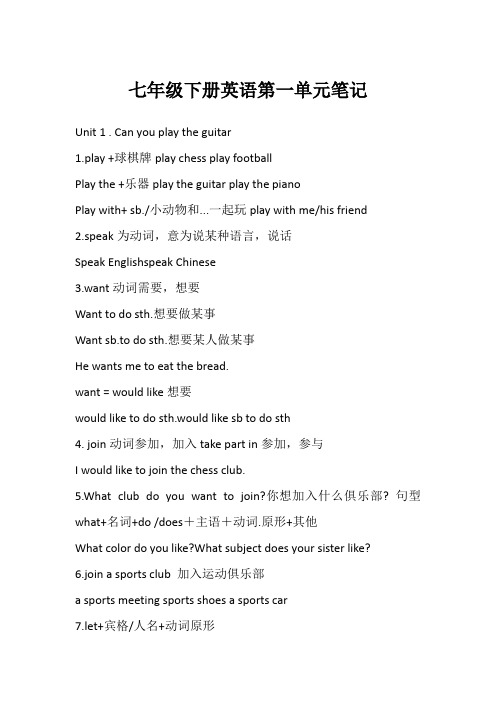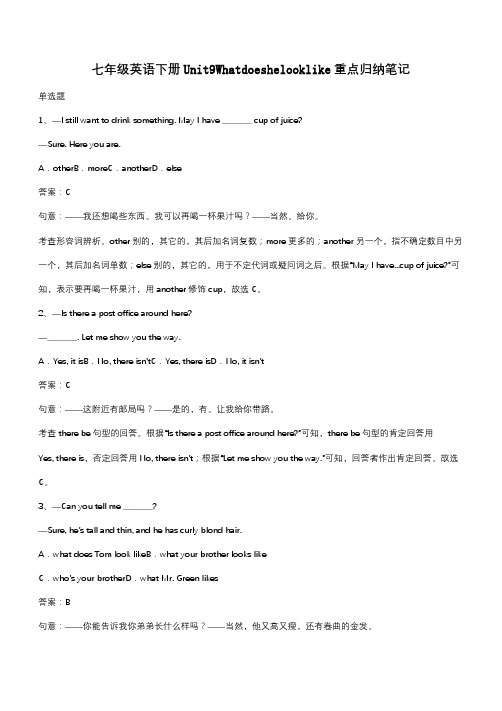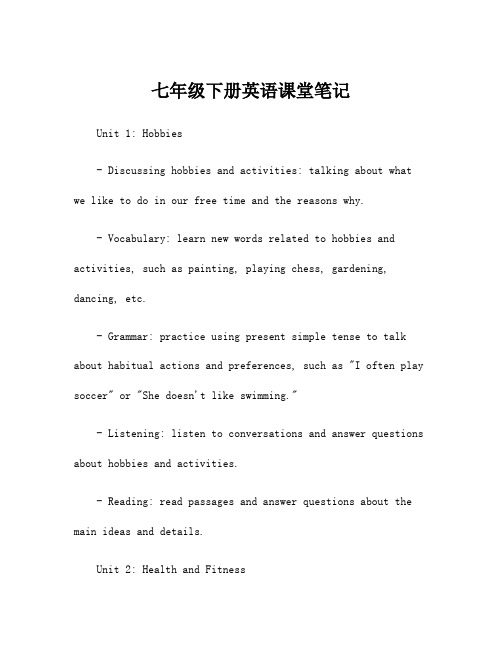七年级下册英语复习笔记 ()
英语七下笔记1至12单元

英语七下笔记1至12单元以下是英语七下1至12单元的笔记,供您参考:Unit 1:- 学习一般现在时态,描述日常习惯和喜好。
- 掌握动词be的用法,以及人称代词的主格和宾格形式。
- 学习形容词和副词的比较级和最高级形式。
Unit 2:- 学习一般过去时态,描述过去发生的事情。
- 掌握动词的过去式形式,以及过去进行时的用法。
- 学习表示时间和地点的介词和副词。
Unit 3:- 学习一般将来时态,描述未来计划和预测。
- 掌握动词的将来式形式,以及将来进行时和将来完成时的用法。
- 学习表示意愿、可能性和必要性的情态动词。
Unit 4:- 学习现在进行时态,描述正在发生的事情。
- 掌握动词的现在分词形式,以及现在进行时的用法。
- 学习表示情感和感觉的动词和形容词。
Unit 5:- 学习一般现在时态的被动语态,描述被动情况。
- 掌握动词的被动语态形式,以及by引导的方式状语从句。
- 学习表示位置和方向的介词和副词。
Unit 6:- 学习形容词和副词的用法,描述事物的性质和程度。
- 掌握形容词和副词的位置和顺序,以及比较级和最高级的用法。
- 学习表示比较关系的连词和介词。
Unit 7:- 学习代词的用法,代替名词或名词短语。
- 掌握人称代词、物主代词、反身代词和不定代词的形式和用法。
- 学习表示目的、原因、条件和结果的连词和介词。
Unit 8:- 学习定冠词和不定冠词的用法,修饰名词。
- 掌握定冠词the、不定冠词a/an的形式和用法,以及冠词的省略情况。
- 学习表示数量、种类和单位的介词和副词。
七年级英语下册(人教版)全册笔记超详细

七年级英语下册(人教版)全册笔记-超详细Unit 1 Can you play the guitar?划划重重点必背句型:1.let‘s go, shall we ?我们一起去,好吗?2.let us go , will you ? 让我们去,好吗/3.What club do you want to join ? 你想参加什么俱乐部?4.I want to join a sports club. 我想参加体育俱乐部。
5.What do you want to do ? 你想干什么?6.I want to play basketball . 我想踢足球。
7.What can you do ? I can play the guitar .8.Can he do Chinese kung fu ?Yes, I can . / No ,I can‘t .9.guitar 为一种乐器,play the guitar 西洋乐器名词前要加定冠词the。
球类运动、棋类、三餐、四季不用定冠词the10.join 意为―参加团体、组织(成为其成员)‖join in=take part in―参加活动、比赛|‖11.go swimming去游泳go+doing 去做某事12.注意区分:speak, say, talk和tell①say 说话What can you say?②speak+语言③talk表示两个人或多个人在一起讲话、谈论(多指随意谈论)talk with sb 与某人交谈talk to sb 向某人说…talk about 谈论…。
④tell 的意思是―告诉,讲述,吩咐‖,讲故事或讲笑话多用tell。
13.Show ―表演,演出,出示……给某人看‖,show sth. to sb.=show sb. sth.。
14.show 作名词,意为―展览,展出‖on show ―在展出‖car show 车展。
人教版七年级下册英语笔记总结

人教版七年级下册英语笔记总结Unit1: How to make new friends?In this unit, we have learned how to introduce ourselves and make new friends. We have practiced using simple greetings like "Hello, I'm Lucy" and "Nice to meet you". We have also learned how to ask and answer questions about personal information such as name, age, and nationality. By talking to our classmates and participating in group activities, we have practiced our speaking and listening skills.Unit 2 What time do you go to school?In this unit, we have learned how to talk about daily routines and schedules. We have practiced asking and answering questions about when we wake up, eat breakfast, go to school, have lunch, and go to bed. We have also learned how to tell time using hours and minutes. By role-playingdifferent scenarios and working on exercises in our textbook, we have improved our vocabulary related to time and routines.Unit 3 I’m more outgoing than my sisterIn this unit, we have learned how to compare and describe people's personalities. We have practiced using comparative and superlative adjectives to talk about different characteristics like outgoing, friendly, and creative. We have also learned how to express preferences and opinions using phrases such as "I think" and "In my opinion". By discussing our own personalities and those of others, we have developed our ability to express ourselves clearly and eloquently.Unit 4 He said I was hardworkingIn this unit, we have learned how to talk about past events and describe what people said. We have practiced using reported speech to recount conversations and statements made by others. We have also learned how to form and use reportedspeech with different tenses like present simple, past simple, and present continuous. By listening to recordings and watching videos, we have improved our ability to understand and communicate in English.Unit 5 Do you want to watch a game show?In this unit, we have learned how to talk about TV programs and preferences. We have practiced using modal verbs like "want", "like", and "prefer" to express desires and choices. We have also learned vocabulary related to different types of TV shows such as game shows, documentaries, and sitcoms. By discussing our favorite programs and explaining why we like them, we have expanded our knowledge of media and entertainment.Unit 6 I’m watching TVIn this unit, we have learned how to talk about present actions and habits. We have practiced using presentcontinuous to describe activities happening now, as well aspresent simple to talk about routines and habits. We have also learned how to use adverbs of frequency like "always", "often", and "sometimes". By sharing our daily activities and discussing our interests, we have developed our ability to communicate effectively in English.Overall, this semester has been a rewarding and enriching experience. We have made progress in our language skills and expanded our vocabulary. We have also learned about different cultures and ways of life through our English studies. I look forward to continuing to improve my English in the future and using it to connect with people from around the world.。
人教版七年级下册英语1-12单元学霸笔记

Unit1小结笔记一、重点单词guitar, sing, swim, dance, join, club, story, violin, people, center, teach, musician.二、形转换:music(人) tooth(复数)swim (ing形式)art(人) piano (人) teach(人)三、短语:play chess, play the guitar, swimming club, speak English, be good at, play the drums, play the piano, play the violin, a little, do Chinese kungfu, tell stories, sounds good, students wanted, make friends, talk to sb, the girl in red, on the weekend/on weekends, English-speaking students,四、句子:1. can you swim?以及回答2. what club do you want to join?五、语法结构:1. can 的用法Can you swim?—yes, I can.Tom can sing well.I can’t draw.2. want to do sth = would like to do sthShe wants to play soccer.=She would like to play soccer.3. be good at/ with/for4. help sb (to)do sth=help sb with sthHe often helps me (to)study English.=He often helps me with my English.5.play basketball, play the guitar, play with snow,Unit2小结笔记一、重点单词:usually, forty, never, early, job, funny, exercise, best, clean, sometimes , taste, life二、词形变换:tooth(复数) early (反义词)job(同义词)run(名词)life(复数)三、短语:get up, get dressed, take a shower, radio station, at night, on weekends, half an hour, a quarter to ten, do one’s homework, take a walk, either…or…, lots of, go to school/work, an interesting job, eat dinner, half past six, go home, go to bed early, eat quickly, get home, after school,四、句子:1、what time do you usually get up?2、when does she go to work?3、I sometimes play basketball for half an hour.4、that’s a funny time for breakfast.五、语法结构:1、when/what time +do/does+主语+动词原形+其他?2、时间表达法:顺读法如:7:20读作seven-twenty倒读法:此方法是“先读分钟数”,再读“钟点数”,使用此方法要注意两点:A、如果分钟数在30以内,就用“分钟数+past+钟点数”表示,介词past意为“过”。
七年级下册英语第一单元笔记

七年级下册英语第一单元笔记Unit 1 . Can you play the guitar1.play +球棋牌play chess play footballPlay the +乐器play the guitar play the pianoPlay with+ sb./小动物和...一起玩play with me/his friend2.speak为动词,意为说某种语言,说话Speak Englishspeak Chinese3.want动词需要,想要Want to do sth.想要做某事Want sb.to do sth.想要某人做某事He wants me to eat the bread.want = would like想要would like to do sth.would like sb to do sth4. join动词参加,加入take part in参加,参与I would like to join the chess club.5.What club do you want to join?你想加入什么俱乐部? 句型what+名词+do /does+主语+动词.原形+其他What color do you like?What subject does your sister like?6.join a sports club 加入运动俱乐部a sports meeting sports shoes a sports car7.let+宾格/人名+动词原形Let us go and watch TV.Let's 让我们..包括说话对方在内。
Let's go, shall we?我们一起走,好吗?Let us go, willyou?让我们走,好吗?8. write stories写故事writer名词作家write to sb.给某人写信Can you write to me?writedown写下,记下write down the sentence9、tell a stony , tell stories 讲故事tellsb. sth.= tell sth.to sb告诉某人某事tell sb. (not) to do sth.告诉某人(不要)做某事10、show名词演出,节目onshow在展览There are many photos on show电视节目,school show学校节目show动词给..看,展示show sb.sth.= show sth.to sb.给某人看某物Show me your photos.= Show your photos to me.11、help sb. withsth.在某方面帮助某人Can you help me with my English?help sb. (to) do sth,帮助某人做某事12 .busy形容词忙碌的,忙的be busy (in) doing sth. 忙于做某事be busy with sth.忙于某事13、home为副词at home在家get home到家go home回家14 . free自由的I want to be a free bird.空闲的Ⅰam free on the weekend.免费的They are working for free.他们在无偿工作。
七年级英语下册Unit9Whatdoeshelooklike重点归纳笔记(带答案)

七年级英语下册Unit9Whatdoeshelooklike重点归纳笔记单选题1、—I still want to drink something. May I have ________ cup of juice?—Sure. Here you are.A.otherB.moreC.anotherD.else答案:C句意:——我还想喝些东西。
我可以再喝一杯果汁吗?——当然。
给你。
考查形容词辨析。
other别的,其它的,其后加名词复数;more更多的;another另一个,指不确定数目中另一个,其后加名词单数;else别的,其它的,用于不定代词或疑问词之后。
根据“May I have...cup of juice?”可知,表示要再喝一杯果汁,用another修饰cup,故选C。
2、—Is there a post office around here?—________. Let me show you the way.A.Yes, it isB.No, there isn’tC.Yes, there isD.No, it isn’t答案:C句意:——这附近有邮局吗?——是的,有。
让我给你带路。
考查there be句型的回答。
根据“Is there a post office around here?”可知,there be句型的肯定回答用Yes, there is,否定回答用No, there isn’t;根据“Let me show you the way.”可知,回答者作出肯定回答。
故选C。
3、—Can you tell me ________?—Sure, he’s tall and thin, and he has curly blond hair.A.what does Tom look likeB.what your brother looks likeC.who’s your brotherD.what Mr. Green likes答案:B句意:——你能告诉我你弟弟长什么样吗?——当然,他又高又瘦,还有卷曲的金发。
七年级下册英语课堂笔记

七年级下册英语课堂笔记Unit 1: Hobbies- Discussing hobbies and activities: talking about what we like to do in our free time and the reasons why.- Vocabulary: learn new words related to hobbies and activities, such as painting, playing chess, gardening, dancing, etc.- Grammar: practice using present simple tense to talk about habitual actions and preferences, such as "I often play soccer" or "She doesn't like swimming."- Listening: listen to conversations and answer questions about hobbies and activities.- Reading: read passages and answer questions about the main ideas and details.Unit 2: Health and Fitness- Talking about health and fitness routines: discussing the importance of exercise, healthy eating, and personal hygiene.- Vocabulary: learn new words related to health and fitness, such as jogging, yoga, vitamins, balanced diet, brushing teeth, etc.- Grammar: practice using present continuous tense to talk about actions in progress, such as "I am exercising right now" or "They're eating fruits."- Listening: listen to dialogues and answer questions about health and fitness routines.- Reading: read articles about healthy habits and answer comprehension questions.Unit 3: School Life- Discussing school routines and activities: talking about subjects, teachers, classmates, and daily schedules.- Vocabulary: learn new words related to school life, such as math, science, geography, history, pencil case, timetable, etc.- Grammar: practice using simple past tense to talk about past activities, such as "I played basketball yesterday" or "She didn't go to the library last week."- Listening: listen to conversations about school experiences and answer questions.- Reading: read passages about school events and answer comprehension questions.Unit 4: Food and Drinks- Talking about food preferences and cooking: discussing different types of food, favorite dishes, and recipes.- Vocabulary: learn new words related to food and drinks, such as vegetables, noodles, pizza, juice, coffee, etc.- Grammar: practice using "like" and "would like" to express preferences, such as "I like chocolate" or "I wouldlike a glass of water."- Listening: listen to dialogues about ordering food and drinks, and answer questions.- Reading: read recipes and answer questions about the ingredients and cooking instructions.Unit 5: Family and Relationships- Discussing family members and relationships: talking about family structure, roles, and responsibilities.- Vocabulary: learn new words related to family and relationships, such as mother, father, brother, sister, uncle, cousin, etc.- Grammar: practice using possessive adjectives todescribe family relationships, such as "My sister's name is Lisa" or "His uncle lives in the city."- Listening: listen to conversations about family situations and answer questions.- Reading: read passages about different familytraditions and answer comprehension questions.These are just some examples of the topics covered in the 7th-grade English textbook. Each unit also includes speaking activities, writing assignments, and interactive exercises to reinforce the skills and knowledge learned in class.。
七年级英语笔记整理(下)

P21 6. be strict with sb 对某人要求严格 be strict in........对....要求严格(指对事,工作,学习等要求严 格) 7. remember to do sth 记得去做某事(说明事情还没做) remember doing sth 记得做过某事,(说明事情已经做过) P 22 8. follow sb to do sth 跟随某人做某事 9. keep sb doing sth 让某人一直做某事 keep + adj 保持... keep in good health = keep healthy 保持健康 10. have fun = have a good time =enjoy oneself 玩得开心 have fun (in) doing sth 做某事很开心 P 23 11. too many + 名词复数 too much + 不可数名词 much too +adj “太....”
- 1、下载文档前请自行甄别文档内容的完整性,平台不提供额外的编辑、内容补充、找答案等附加服务。
- 2、"仅部分预览"的文档,不可在线预览部分如存在完整性等问题,可反馈申请退款(可完整预览的文档不适用该条件!)。
- 3、如文档侵犯您的权益,请联系客服反馈,我们会尽快为您处理(人工客服工作时间:9:00-18:30)。
七年级下册英语复习笔记U n i t1W h e r e’s y o u r p e n p a l f r o m?[学习要求]1、掌握表示国家、国籍、语言、城市的词汇。
2、掌握询问籍贯、居住地、语言等的句型。
Where are you from? I’m from Canada.Where do you come from? I come from Singapore.Where does he live? He lives in Paris.What language does she speak? She speaks English.Where is Toronto? It’s in Canada.3、掌握行为动词的一般现在时。
4、能读懂与上述内容相关的语言材料。
5、学会用所学词汇、句型制作身份卡片、征询笔友。
[学习建议]1、正确使用表示国家、国籍、语言的词汇,如:England / English, America / American.2、了解be from相当于come from, 但是句型转换时,方式不同,Are you from …? Do you comefrom …?3、建议结合实情,增加谈论街道、楼院、门牌号的练习。
4、学会用所学词汇、句型制作身份卡片、征询笔友。
一.W h e r e+b e+主语+f r o m?=W h e r e+d o/d o e s+主语+c o m e f r o m?W h e r e a r e y o u f r o m?=W h e r e d o y o u c o m e f r o m?B e f r o m=c o m e f r o m联系动词实义动词例:S t o n e i s c o m e f r o m C h i n a.(×)注:b e动词与实义动词永远不能连用。
二.国家国人国人复数语言首都(t h e p e o p l e R e p u b l i c s o f C h i n a)(P.R.C.)C h i n a C h i n e s e C h i n e s e C h i n e s e B e i j i n gC a n a d a C a n a d i a n C a n a d i a n s E n g l i s h,F r e n c h O t t a w aF r a n c e F r e n c h F r e n c h m e n F r e n c h P a r i sJ a p a n J a p a n e s e J a p a n e s e J a p a n e s e T o k y o(t h e U n i t e d S t a t e s o f A m e r i c a)(U.S.A.)A m e r i c a A m e r i c a n A m e r i c a n s E n g l i s h W a s h i n g t o n.D.C.(t h e u n i t e d K i n g d o m)E n g l a n d E n g l i s h m a n E n g l i s h m e n E n g l i s h L o n d o nA u s t r a l i a A u s t r a l i a n A u s t r a l i a n s E n g l i s h C a n b e r r aW h e r e d o e s h e l i v e?H e l i v e s i n B e i j i n g.W h e r e对地点提问的秘诀是:一定,二改,三组合一定,确定疑问词W h e r e二改,将原句改为一般疑问句,将第一人称改为第二人称三组合,把前面的部分及后面部分组合例:I l i v e i n K u n m i n g(画线提问)W h e r e d o y o u f r o m?L i v e是一个不及物动词及物动词后可以直接加宾语,不需要加任何介词。
不及物动词后不可以直接加宾语,但可以单独使用。
如果想要加宾语,需要加上介词。
四.W h a t l a n g u a g e d o e s s h e s p e a k?S p e a k:既可以做及物动词,也可以做不及物动词。
翻译为“说,讲话”做及物动词时,只能接某种语言做宾语。
例:1.H e s p e a k s(v t)E n g l i s h.2.M r s t o n e i s s p e a k i n g.(v i)S p e a k t o s b和某人讲话S a y:翻译为“说,述说”用系统语言表达自己的想法,后面必须跟说话的内容,宾语只能是话语,而不能是人。
例:H e s a y s h e i s a b o y.T e l l:翻译为“告诉,讲述。
”尤其用在讲故事,讲笑话(t e l l s t o r i e s/j o c k s)T e l l s b s t h(告诉某人某事)t e l l s b t o d o s t h(告诉某人做某事)例:M y m o t h e r t e l l s m e t o s t u d y w e l l.T a l k:翻译为“交谈,谈论。
”后面常跟t o,w i t h表示与某人谈话。
如果跟a b o u t,o f表示谈话的内容。
T a l k t o s b=t a l k w i t h s b和某人谈话T a l k a b o u t s t h=t a l k o f s t h谈论某事五.i n t e r e s t i n g与i n t e r e s t e di n t e r e s t i n g:指事情本身有趣,意为“有趣的,令人感兴趣的”厂子句中作定语,表语。
I n t e r e s t e d:指人对……感兴趣(b e i n t e r e s t e d)例句:T h i s i s a n i n t e r e s t i n g s t o r y.I a m i n t e r e s t e d i n l e a r n i n g E n g l i s h.六.a l i t t l e和l i t t l eA l i t t l e:修饰不可数名词,表示肯定含义,意为“有一些,少量”如:T h e r e i s l i t t l e w a t e r i n M r.S t o n e’s c u pL i t t l e:修饰不可数名词,表示肯定,翻译为几乎没有。
如:I k n o w l i t t l e J a p a n e s e拓展:M a n y+可数名词复数e g:M a n y b o o k sM u c h+不可数名词e g:M u c h m o n e yS o m e+可数名词/不可数名词e g:S o m e b o o k/w a t e rA l o t o f+可数名词/不可数名词七.I l i k e g o n g t o t h e m o v i e s w i t h m y f r i e n d s a n d p l a y i n g s p o r t s.1231.l i k e d o i n g s t h:喜欢干某事,表示个人兴趣爱好,经常性的动作。
E g:I l i k e p l a y i n g f o o t b a l lL i k e t o d o s t h:表示想去做某事,表示最近想去干某事。
2.去看电影G o t o t h e m o v i e s G o t o a m o v i e G o t o t h e c i n e m a G o t o s e e a m o v i e3.a n d和w i t hA n d连接两个主语,通常放在句首,其谓语动词复数。
(连词)w i t h为介词,后面跟名词或代词的宾格,通常放在句末。
E g:H e a n d I a r e b o t h s t u d e n t sH e l i v e s i n C h i n a w i t h h i s p a r e n t s.U n i t o n e重点词组1.p e n p a l笔友2.s p e a k E n g l i s h讲英语3.b e f r o m=c o m e f r o m来自4.o n w e e k e n d s在周末5.w r i t e t o d o给某人写信5.l i v e i n居住7.a l i t t l e一些8.l i k e s a n d d i s l i k e s喜欢/不喜欢9.l i k e d o i n g s t h喜欢做某事10.l i k e t o d o s t h想去做某事11.t e l l s b a b o u t s t h告诉某人关于某事12.t e l l s b t o d o s t h告诉某人去做某事13.t a l k t o/w i t h s t h1和某人谈话4.t a l k o f/a b o u t s t h谈论某事15.b e i n t e r e s t i n g i n对……感兴趣16.g o t o t h e m o v i e s=g o t o t h e c i n e m a=g o t o s e e a f i l m去看电影17.h e a r f r o m s b收到某人来信U n i t2W h e r e’s t h e p o s t o f f i c e?[学习要求]1、掌握方位介词及词组:on, near, between, next to, across from, in front of, behind。
2、掌握“where”开头的特殊疑问句。
3、掌握问路和指路的常用语。
Is there a bank near here?Yes, there’s a bank on Center Street.Where’s the supermarket?It’s next to the library.Is there a pay phone in the neighborhood?Yes, it’s in front of the post office.[学习建议]本单元通过谈论邻近地区各部方位的话题,学习问路、指路的表达方式及有关方位介词的用法。
